

Travel Baseball: The Ultimate Guide for Parents and Players
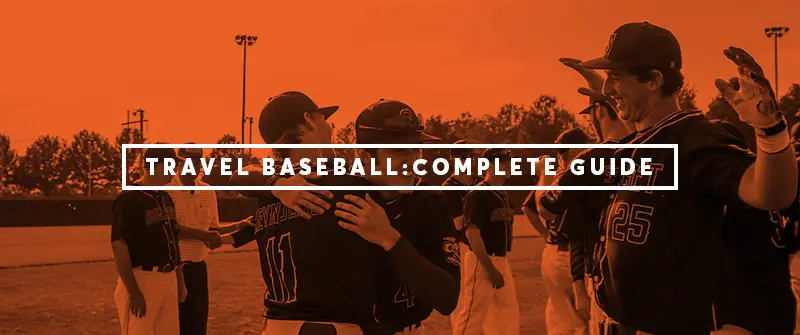
Table of Contents
What is travel baseball, what to look for in a travel baseball team, travel baseball vs. little league, travel baseball pros and cons , criticisms and controversy, is travel baseball worth it.
For many families, the transition from Little League to travel baseball comes with stress, anxiety and questions about what to look for in a team and what to expect from the experience — not to mention the question of whether making the switch from a more laid-back rec ball program to a more competitive (and expensive) travel club is the right decision in the first place.
In this post, we’re going to go over everything you need to know about getting started with youth travel baseball. We’ll help you answer the questions above and determine whether travel baseball is a good fit for your son or daughter.
If you have a softball player in the family, you may also want to check out our article “ What to Look For in a Travel Softball Team ,” which covers some of the same information from a softball perspective and dives deep into my personal experience as an elite-level amateur player and college recruiting prospect.
Table of Contents :
- How to Choose a Travel Baseball Team
- Travel Baseball Pros and Cons
- Is Travel Baseball Worth It?
First, it’s important to understand what a travel baseball team is and how travel baseball is organized.
There are tens of thousands of travel baseball teams around the country, and their popularity has exploded over the past two decades. As recently as the 1990s, travel baseball was a niche experience limited mostly to elite players in baseball-rich areas like Texas and California. Today, participation is seen by many as a near necessity for talented players to develop their skills and hone their game against the best competition they can find.
Whereas Little League is the dominant organization when it comes to recreational youth baseball, there are multiple organizations throughout the country that host hundreds of travel tournaments each year. Some of the biggest and most popular are USSSA (United States Speciality Sports Association), AAU (Amateur Athletic Union), Triple Crown Sports , and Perfect Game . Travel baseball teams often participate in tournaments organized by more than one of those organizations.
A team can be started by anyone. Many are formed by parents, but many others are formed by high school and former college coaches. Depending on their organizational goals, some programs have just one team that participates in one age bracket (such as 10 and under), while some are run like businesses and have teams that compete in every age group.
Some huge organizations, such as California Baseball Academy (CBA), even have multiple teams within the same age group, located in multiple cities. CBA has teams not only in California, but also in Nevada, Texas, Utah and the southeast. High-level programs like that are often known for attracting top talent, for training recruits into elite players, and for feeding those players into nearby colleges and universities.
Travel Baseball Competition Structure
Virtually all travel baseball games are played on weekends in a tournament format. Those tournaments can theoretically be held anywhere, but are frequently held at multi-field facilities in easily-accessible travel hubs. For example, many Florida tournaments are held in Orlando because it’s in the relative center of the state, it has plenty of hotel rooms, and it’s home to many great baseball facilities. The farther you live away from such a hub, the more you should expect to travel.
Most tournaments begin with pool play, meaning that teams are guaranteed a number of games before heading into single elimination. A team can expect to play anywhere from three to eight games over the course of a two-day or three-day tournament, depending on how they perform.
There is no set number of tournaments a team must participate in. Each team decides which tournaments to enter on a case-by-case basis, taking into consideration factors such as age level, skill level, and cost. In general, two tournaments per month can be seen as about average, although higher-level teams may play more frequently.
Most organizations run regional and national championships, which are invite-only. For example, USSSA hosts “qualifier” tournaments, where the winner of the championship game (and sometimes the runner up) can earn a bid to the USSSA national tournament.
Additionally, beginning at age 14, some teams start participating in “college exposure tournaments,” where college scouts come from across the country to watch and evaluate prospects. These tournaments are typically more expensive than regular tournaments, and are often farther away.
How to Join a Travel Baseball Team
If you’ve decided to join a travel baseball team and aren’t sure where to find one, there are a number of resources available.
It may go without saying, but word-of-mouth can be a valuable first reference point. If you’re thinking about switching to travel baseball, chances are that you already know someone in your area who has made the jump. If so, don’t be afraid to ask them questions about the team and their experience. It’s a big commitment — both in terms of time and finances — so it’s important to make sure you find the right club for your son or daughter.
In addition to word of mouth, many organizations offer a list of active teams on their website. For example, USSSA has a tool that lets you filter teams by age level, skill level, and location . There are also many state-based forums and Facebook groups where coaches post their team’s tryouts (and positions needed). As an example, here are Facebook groups for travel baseball teams in Florida and Michigan — you can find similar groups for every state.
Another good option is FieldLevel.com , which (like the USSSA site) allows you to filter teams by state and level. While not every team is listed on that website, it does include over 4,000 clubs.
Here are eight things to think about when evaluating teams. These factors will make a big difference when it comes to your overall experience, so take the time to think about them, and don’t be afraid to ask questions of parents and coaches.
1. Coaching
A coaching staff can make or break a team. How coaches manage players, keep the game fun, instill the fundamentals, and focus on development — not only as athletes, but as young men and women — is extremely important.
Some travel baseball teams have parents or grandparents serving as the head coach. While that can be fine, it’s important to make sure those coaches don’t make keeping their own child on the field a priority. Before committing to a team, spend some time researching it by watching a practice and talking to current and/or former players and parents.
What’s the coaching style? Do they have high expectations but still encourage and love their players? Or, on the other hand, are they screaming at players when they make a mistake?
Additionally, are players treated equitably, or do some get preferential treatment based on their relationship to the coach or their financial contribution to the team?
Ideally, your child will be a part of that team and organization for consecutive years, rather than bouncing from team to team. As such, determining whether the coaching staff is a good fit is a crucial first step.
2. Cost
For many parents, this is the most terrifying aspect of travel baseball.
Just how much of a toll is this going to take on your bank account? The specific answer varies, but the typical range of cost for participating in travel baseball is between $500 and $2,500 per year.
That said, you can end up spending a lot more than that. Back in 2011, CBS News reported that one Georgia family paid $4,000 per year for their 9-year-old son’s travel team. You can imagine that older players in elite programs that travel all over the country can spend even more over the course of a season.
Typically, the more intensely focused a program is on developing its players for college baseball, the more money the program is going to cost. On the other hand, teams that are playing more for the fun of it — those looking for just a little more structure and competition than offered by Little League — won’t put as much of a dent in your wallet.
There are a number of specific factors that go into how much it costs to be on a team:
- Where you live . If you live in a baseball hub, like Texas or California, you won’t have to travel as far to get to tournaments. Many teams from rural areas regularly drive across multiple states (or sometimes even fly) to tournaments. As such, where you live will likely be the single biggest variable in your overall travel baseball cost.
- Whether you have to buy your own equipment . Some teams are sponsored by equipment companies like Easton and Rawlings and have their bats, gloves and cleats provided either for free or at a reduced cost. Obviously, this can be a huge savings. Also, keep in mind that (unfortunately) equipment is often viewed as a status symbol in travel baseball. If your child joins a team where every other player has multiple bats and position-specific gloves, he or she is going to press you for similar gear.
- Whether you have to rent facilities . Some teams practice exclusively at public fields. Others have little or no access to such facilities and have to rent fields and/or indoor space (especially for winter workouts). This can have a huge impact on the overall cost of participation.
- Whether or not coaches are paid . Some teams — typically the more competitive ones — pay their coaches small stipends and/or cover their cost of travel. On one hand, this tends to lead to better coaching. On the other hand, families are the ones who will ultimately foot that bill.
- How competitive the team is . Higher-level tournaments typically have higher fees. Lower-level tournaments, operated on a more sub-regional basis, are usually much less expensive to enter. If cost is a concern, make sure you know what types of tournaments the team usually enters over the course of the season.
3. Location
As stated earlier, location is a key factor in deciding which travel team to play for. If you’re fortunate enough to live in California, Florida or Texas, you’re going to have a lot of opportunities to play with and against high-level competition right in your backyard.
But outside of those states, it’s a little bit tougher, and you have to decide how committed you are to playing at the highest possible level.
For example, if you live in a medium-sized town outside of a major baseball hub, chances are you have at least a couple of travel ball options. However, the odds are that those options are not the absolute cream of the crop when it comes to coaching and competitiveness. In order to play for the absolute “best” team possible, you might have to commute from your mid-sized town to the nearest major city.
So you’ll be faced with the following choice: play on a lower level team that’s closer to home, or drive a hundred miles or more for twice-weekly practices? It may sound crazy, but many families do just that.
Why would they commit so much time and money to their son or daughter’s athletic pursuits? It comes down to goals. Better teams often provide better coaching and more opportunities for exposure to college and professional scouts.
What’s the team’s mission? Is the focus on fun, player development, college exposure, or a mix of all there? Teams can have many different goals and missions, and there’s no right or wrong approach.
However, it is possible that a team’s mission does not align with your values and goals, and you need to think about this before committing, as a compatibility mismatch can lead to coach-parent and coach-player tension.
5. Organization
Consider the reputation of the organization you’re evaluating. When you join a team, you and your son or daughter will essentially be endorsing everything the program stands for. If they’re known for dirty play or being disrespectful to the game, you’ll be associated with that.
And believe it or not, the baseball world is a small and surprisingly tight-knit community. College coaches tend to know which programs produce bad apples — and they avoid them. In fact, many college coaches will completely write off an entire organization that has a reputation for not playing the game the right way or for having disrespectful players.
6. Playing Time
There’s an important balance between getting enough playing time and being challenged. Before committing, ask the coaching staff what kind of playing time your child can expect — including at what position.
If there are two returning shortstops, he or she most likely won’t be playing there and might have to learn another position. That’s not a bad thing: college coaches want players that are versatile, and many players change positions as they get older and their bodies develop.
Still, it’s helpful to know what to expect ahead of time. Getting game reps is important from a development perspective, but also just from a fun perspective: no kid wants to consistently travel to a tournament only to sit on the bench for most of the weekend.
7. Skill Level
Be realistic about your child’s skill level, and pay attention to the level of competition around him or her at tryouts (i.e., the skill levels of the other players). If your kid has the fight and desire to compete for a spot (like they’ll have to do if they make it to college ball), then putting them on a team where they’ll be challenged is the best option.
But if he or she is there to have fun and make friends, with no burning desire to be constantly improving, then choosing a travel team that’s more low-key will be the better call.
8. What You’re Giving Up
Travel baseball tournaments are on weekends, and players often have to sacrifice certain things that are part of a normal childhood.
Is your son or daughter willing to miss out on things like birthdays, sleepovers and school dances, because most of their time is spent doing homework, traveling to and from games and practices, practicing on their own (possibly including private lessons), and spending nearly every summer weekend at the ballpark?
And are they willing to sacrifice the material things that matter to kids — things like clothes, video games, new smartphones, etc. — because so much money is being spent on baseball?
As I wrote in THV’s guide to travel softball , my family made major sacrifices to support my athletic pursuits.
For some, their love of the game is so great that giving up these things is a no-brainer. For others, they may regret missing out on these social activities. And that’s perfectly fine! Just be honest with each other and talk about the true costs of travel baseball — because it’s not just the sticker price.
There are some important similarities and differences between competitive travel baseball and recreational baseball. Both can teach many valuable life skills, such as work ethic, good sportsmanship, teamwork and bouncing back from failure. But they are very different when it comes to time commitment and competitiveness.
The Little League schedule usually runs from the late spring through early summer, with teams practicing twice per week and playing two games per week. The total number of games per season varies, but it usually ranges from 10 to 20. It’s a local program, which means travel is either limited or non-existent. In general, Little League coaches are parents.
Little League can be a great place for kids as young as 4-years-old to start playing the game. They’ll learn the rules and the absolute basics of hitting, pitching and fielding in a fun an easy-going environment (except for the occasional parent that takes their coaching position overboard).
Overall, Little League fits the classic stereotype of youth baseball: kids having fun playing the greatest game in the world, without much pressure or focus on player development.
Back in the day, Little League would feed into middle school and high school programs, which carried the bulk of the weight when it came to getting payers ready for college and the pros. But today, the reality is that it’s almost impossible to get the coaching and skill development you need by participating only Little league or other rec ball programs.
That’s especially true when it comes to the gap between “Majors” Little League (12-and-under) and high school. Few middle schools still have baseball programs, and those programs that do exist tend not to be very good. Likewise, while Little League offers both a Junior division (12-14) and a Senior division (14-16), those leagues tend to pale in comparison to the coaching and competition offered by travel ball.
So, if your son or daughter is serious about playing baseball at a high level, it’s especially important to focus on the transition to travel ball at around the age of 11 or 12.
There are positives and negatives when it comes to travel baseball. Here are a few of each.
- Better competition : Players are more serious about the game and more driven to improve. This higher level of competition will help push your son or daughter to improve their own skills.
- Better coaching : Travel baseball coaches tend to be better qualified, more knowledgeable, and better-connected. At the highest levels of travel ball, teams often employ former professional coaches.
- More exposure : Aside from high school baseball, travel ball is the primary means of exposure to college coaches and pro scouts. Plus, travel teams often attend showcase tournaments and camps.
- More games played : Travel teams play significantly more games per year than rec ball teams.
- Facilitates travel : Sometimes seen as an ancillary benefit, the travel itself can be a valuable and eye-opening experience for players. Many kids don’t have an opportunity to travel out of their own area or state, and travel baseball can provide that.
- Encourages character development : Because travel teams are more serious, there’s a greater emphasis put on things like being on time, demonstrating maximum effort, and having a good attitude.
- Cost : Travel baseball is expensive — sometimes absurdly so. Families often spend around $2,500 per year, but the costs can be even higher.
- Time commitment : Even a moderately competitive travel team can consume an entire summer’s worth of weekends.
- Ultra-competitive : On most travel teams, there’s a balance between player development and winning. What you won’t often find is an “everybody plays” approach. For the most part, the best players will play the most, which makes for a highly-competitive environment.
- Tougher workouts : This can be a pro or a con, depending on the player’s perspective and goals. Tougher workouts can lead to better outcomes, but they can also be mentally and physically taxing if the player isn’t fully invested.
- Lack of diversity : Because travel baseball is expensive, it has often been criticized for a lack of socioeconomic and racial diversity.
Travel baseball provides many benefits and can be a valuable opportunity for players who are serious about the game and committed to playing at the highest possible level. However, it’s not without its share of criticism and controversy.
In an essay titled “ Left Out ,” MLB superstar Andrew McCutchen wrote about how kids like him, who grow up in low-income families, are often excluded from travel baseball and thus systematically disadvantaged when it comes to development and exposure:
“When you’re a kid from a low-income family who has talent, how do you get recognized? Now, you have to pay thousands of dollars for the chance to be noticed in showcase tournaments in big cities. My parents loved me, but they had to work hard to put food on the table, and there wasn’t much left over. They didn’t have the option of skipping a shift to take me to a tournament over the weekend. […] That’s the challenge for families today. It’s not about the $100 bat. It’s about the $100-a-night motel room and the $30 gas money and the $300 tournament fee.
[…] If you’re a poor kid with raw ability, it’s not enough.”
McCutchen was lucky: an AAU coach “discovered” him at the age of 13 and covered his travel ball expenses. But most kids from similar situations aren’t so fortunate.
Why is this important for you, the parent of a child thinking about joining a travel team?
On one hand, it’s important to be aware of how the systems we participate in affect our society. But on a much more specific level, you should know that your child will be entering a largely homogenous environment.
On top of that, kids from lower-income families can often feel out of place in travel ball — especially if they don’t come to the ballpark with the latest, top-quality gear like their teammates. This social dynamic can have a powerful impact on your child’s experience.
Additionally, travel baseball means that both your family and your child will be spending less time within your own community.
There’s been a lot written in recent years about how travel baseball may be contributing to the erosion of communities , because it pulls families out of local baseball programs that once served as important civic institutions.
This is evidenced by the sharply declining participation in Little League. In the organization’s Southeast Region (a hotbed for a travel baseball), the number of Little League players has plunged by nearly 50% since 2007 .
So we’ve come to the biggest question: Is travel ball worth it?
If you want to improve your skills and have the best chance to play in college or the pros, travel baseball is the way to go. But remember: there is a range of cost and time commitment within travel baseball. Your son or daughter doesn’t necessarily have to opt for the most expensive travel team in order to be sufficiently challenged (and later on, to get noticed by college coaches).
Your goal in evaluating teams should be to find the right balance of:
- Financial commitment
- Time commitment
- Intangible sacrifices (school events, community involvement, etc.)
- Baseball goals
After reading this article, you should have a very solid understanding of what Little League and travel baseball have in common, their differences, and what you should be looking for in a club.
Remember, this is your child’s choice to. Help them see the pros and cons of each option. And although we stated it earlier, we cannot stress this enough: you cannot dictate your son or daughter’s commitment to the game of baseball. It’s up to them. So, support them in whatever capacity they want to participate. If you do, they’ll never regret or forget the amazing experiences, friends, and lessons learned playing this great game.
The Hitting Vault is the most popular, most trusted and highest rated online hitting community.

Alexa Peterson

Join 93,000 Subscribers Who Love Hitting.
Get two articles delivered to your inbox each week.
Where teams and players meet their match
Step into a new era of travel sports, where finding and building your dream youth team has never been easier.

Get on the field
Everything you need to find teams and tournaments
Up until this point, travel sports has been segmented and difficult to navigate. We are the central location for all things travel ball.

"We've been able to find some of the best players and their families in our area. This has completely changed how we run our team."

Travel Baseball Uncovered: A Guide For Parents And Players
Let’s talk about baseball—travel baseball, to be exact.
For many, moving from the Little League to travel baseball feels like catching a curveball. After all, it’s more than just a pace change; it’s about trading Saturday afternoon matches on a grassy field for serious club competitions that come with a higher price tag.
You might be thinking, “Is this the right play for my little slugger?” or “How do I even go about choosing a team?”
Well, here’s our chance at bat. We’ll walk you through everything youth travel baseball has to offer, including answering these questions and more.
Table of Contents
What is Travel Baseball [Explained]
Travel baseball is just what it sounds like. It’s when youth teams have to travel in order to have their games and tournaments. This is usually the next step after traditional recreational or Little League.
Since the level of competition is much higher, it can help them develop their skills.
But preparation comes at a cost—literally. And all that time on the road can take up your schedule very quickly. But despite all that extra work, they’ll get an exciting adventure out of it. Now, they’ll face off against teams from different cities, states, and sometimes even countries.
The love for Travel Baseball is Growing Fast.
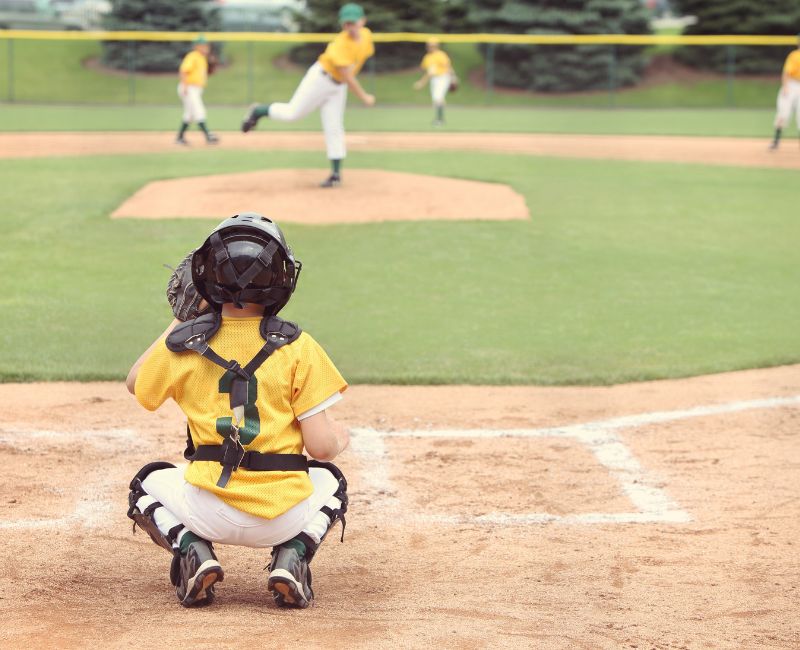
In recent years, travel baseball gained an exponential amount of popularity and saw thousands of teams pop up across the country.
Before the 90s, it was a relatively niche experience only limited to players nestled in regions like Texas and California.
Nowadays, participation is considered necessary for young players wanting to sharpen their skills and go up against some really tough competition.
Instead of focusing on the local leagues like recreational youth baseball does, travel ball operates under various organizations, hosting hundreds of tournaments each year.
Some big names include USSSA (United States Specialty Sports Association), AAU (Amateur Athletic Union), Triple Crown Sports , and Perfect Game .
The ambitious goal for any team is to face off against as many different teams as possible to gain experience and test their skills.
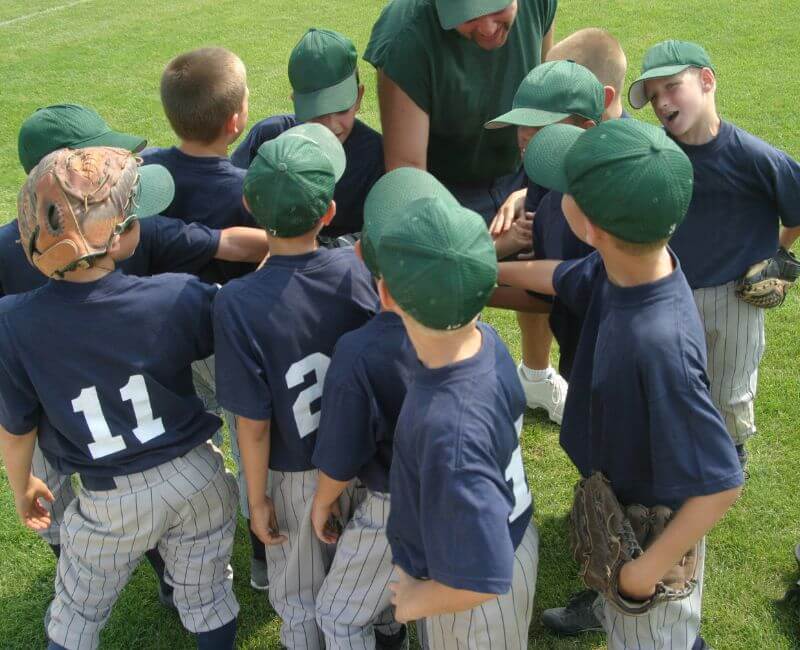
Everyone can create a travel baseball team. It doesn’t matter if you’re a parent, high school teacher, or someone who coaches college kids.
The highlight of the season is the travel baseball tournament. Bringing together talented teams from different parts of the world to compete.
This lets players show their skills to a bigger audience, including scouts and college coaches. These tournaments are organized by many institutions and happen locally, regionally, or even nationally.
There’s nothing cooler than the USSSA World Series, though. Every year, it’s hosted by the United States Specialty Sports Association.
You’ll find talent from all over America coming here to fight for that top spot. But another epic tournament is the Triple Crown Summer Nationals, where they hold it at Myrtle Beach
in South Carolina. It attracts teams from everywhere and is known for great competition and vacation vibes.
A unique little competition is held in Cooperstown, New York, known as the Cooperstown Dreams Park Tournament.
Cooperstown, known as baseball’s birthplace, offers a unique week-long stay in baseball-style barracks. You can visit the National Baseball Hall of Fame.
These intense and challenging tournaments bring out some of the most talented players young kids have to offer. It’s also a great way to boost your young player’s confidence in playing on those big stages!
Different Levels Of Travel Teams And Their Requirements
It’s not just one level fit all for travel baseball teams. They’re organized into various levels based on skill, experience, and commitment from players.
Imagine putting someone who only knows how to throw with moderate force into a contest against someone who does it with full force.
The team you choose for yourself should align with your skill level, how much free time you have, and your developmental needs as a player. Here’s an overview of different levels:
1. Local Travel Teams : For beginners starting their journey through travel baseball. The games they play are mostly local or within a close driving distance. Practices only happen a few times a week, and games during the weekend.
2. Regional Travel Teams : For players with more experience and higher skill levels. They go on trips for games and tournaments that will require overnight stays at places. Commitment level is higher, with practices being more frequent along with a longer season.
3. Showcase Travel Teams : The big leagues of young kid baseball players. These teams are made up of highly skilled people who are very serious about baseball. They have college scouts and recruiters present their games. This includes going to different states for showcase tournaments.
You’ll need to be extremely committed to even think about trying out for this team, and their practices are rigorous and frequent, lasting all year round!
Benefits of Playing in a Travel Baseball Team
A lot of benefits come from playing travel baseball.
The biggest one? It can help players get to their goals. It’s not just about playing a game, especially when you want to make it big. It’s actually an experience that provides lifelong skills that can be applied everywhere else.
Competition in recreational leagues is nothing compared to this. It’s way higher. This allows players to grow new and old skills at a faster rate.
There’s also an intense training schedule that demands discipline, resilience, and focus. These qualities go beyond just sports.
Participating in high-profile tournaments also gets the attention of other coaches and scouts. Which makes it easier for them to open doors for scholarships and professional contracts.
Traveling away from home just for games might seem like a drag, but it builds responsibility and maturity. It is a demanding journey for sure, but very rewarding.

Did MLB Players Play Travel Baseball?
Definitely! A lot of Major League Baseball (MLB) players used travel baseball as their starting point, too. It gives them all the exposure they need, honing skills at such a young age along with fierce competition.
Take Bryce Harper , for example. He’s one of the biggest names in MLB today. His journey started back when he was a child playing for the Southern Nevada Bulldogs 14U travel team. The opportunity came up where he could go against older players who were more experienced than him. This experience helped shape his professional career.
Albert Pujols also played travel baseball when he was younger on his team called Fort Osage Indians Travel Team before sailing into the Hall of Fame.
Clayton Kershaw ? Yeah, him too! Another name you hear often in MLB didn’t start there either — he played for the Dallas Tigers Travel Team where he developed early on gaining crucial skills and discipline that are instrumental in his success today.
How to Find a Travel Baseball Team in Your Region?
If you’re a young baseball player who wants to take their skills to the next level, then joining a travel team is a great opportunity. If you are a parent and want to make your child the next MLB star, then travel baseball teams are a great place to start with.
These teams play across the country and allow players to show their talents against top-tier competition. But how do you find one of these teams?
Here’s a guide on how you can join a travel baseball team in the USA.
Check your local youth baseball organization.
Your first step should be checking with your local youth baseball organization. Chances are they have travel teams that play in leagues and tournaments outside of the regular season. If they don’t, then it’s likely they know someone who does.
Drop by showcases and camps.
In-person events like showcases and camps are great places to meet coaches and scouts from travel baseball teams. They’re designed specifically so players can showcase their skills and get noticed by recruiters.
The internet holds many answers, including finding a travel baseball team. Websites like USSSA Baseball, Perfect Game USA, and Travel Ball Select list lots of travel baseball teams based on state, age group, and skill level — all at a click away.
Talk to other parents and players.
If you want first-hand experience, then talk to other parents or players who have been through this process before. They can give useful insight into which teams are reputable, well-run, and competitive.
For example, if you live in Texas, then one option could be the Texas Bombers Baseball Club — an organization that has multiple teams at different age levels and is known for developing young talent. You can learn more about them by visiting their website or attending one of their tryouts.
How to Find the Perfect Travel Baseball Team?
Identify the skill level and commitment of the player.
First thing first, you need to figure out how committed your child is to the sport and their skill level. If he is naturally gifted athlete then you should help him to follow his dream.
Research Local and Regional Teams
Begin by looking at teams that are close by. These teams usually have varying levels of skill and serve as great entry points for most players.
You can check their websites and social media pages to learn more about them such as philosophy, coaches, players, and game schedule.
Attend Local Games and Practices
Sitting in on local games and practices allows you to get a firsthand look at how they run things. You’ll be able to see their coaching style, how they interact with the players, and the overall team dynamic. With this insight, it’ll be easier to make a decision.
Speak with Coaches and Parents
While observing is good, it isn’t enough. Take some time out of your day or week to speak with coaches.
This allows you to gain an understanding of their training methods, the expectations they have for your child, and the goals they want them to reach. It’s also good practice to talk to other parents so you can get a general idea of what people think about the team.
Consider Logistics
Logistical factors are important, too, so don’t forget about them. Make sure that the team’s practice location is suitable for you and your family’s schedule since it may be far away from where you currently live or work.
The game schedule should be looked at as well because there could be conflicts in dates that would keep you from attending games.
Tryouts & Evaluations
Most teams hold tryouts or evaluations for people who are interested in joining. If this is offered, take advantage of it because it gives your child the chance to showcase their skills and for you to see if the team would be a good fit.
A player’s evaluation is also helpful because it gives you insight into how strong the team itself is.
Travel Baseball Season Preparations
Preparations before the pre-season.
Before the baseball season starts, you’ll want to make sure that your child is mentally and physically ready for the long days ahead.
So, let’s start with an off-season workout routine to help build strength and agility. But don’t forget about eating well and getting enough sleep. Plus, practicing regularly can take their fielding, pitching, and hitting skills way up.
During the season
Once the season starts, it’s important to stay fit and perform at your best. You’ll want to communicate with their coach to keep track of your child’s progress as well as any areas they need improvement in.
Another thing you should do is show up to their games and practices. It helps you stay in tune with how the team is performing and also supports your child. And finally, always keep their lines of communication open, whether it’s about pressure or their anxiety.
Post-Season
After a long season, it’s important to take a break. Reflect on the games you had together. Acknowledge all the good things they did but also focus on areas they can improve in.
Give them some downtime so they can rest and recover. Even though they’re chilling around, don’t let them become bums — physical activity is still important for them during this time.
Travel Baseball vs. Little League
Both types of baseball have their own unique experience and benefits that come along with it. The choice of which one to put your kid into mostly depends on what they want out of it.
For example, travel baseball is more competitive. It attracts players who are committed to sports no matter what and are willing to travel around just for a game against top talent in various regions. Not only does this provide intense competition but also high-level coaching.
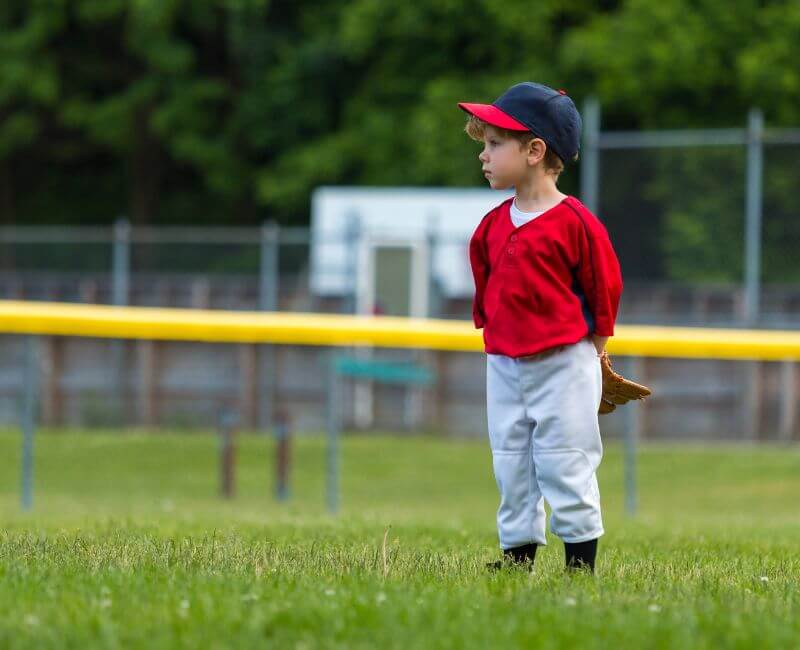
It does require a lot of time, as seasons are much longer than in little leagues with more games and practices.
If you want your child exposed more, then this would be a good option, as you can see from Bryce Harper, Albert Pujols, and Clayton Kershaw.
Now, little league baseball is less demanding. It’s generally more focused on the community and not so much on traveling and time.
It’s actually a great option for kids who still love the sport but aren’t ready to commit to such a demanding schedule. They focus on learning fundamental skills, enjoying the game, and fostering a sense of community.
You can learn more here: Travel Baseball Vs Little League
The Cost of Playing Travel Baseball
If your kid has a future in baseball, you might want to consider enrolling them in travel baseball. The only problem is that this option is much more expensive than local leagues.
Local leagues tend to have low costs because they don’t do as much traveling as travel teams have to do. On top of paying for the actual games themselves, there’s also the top-of-the-line coaching and amazing facilities that the team needs to cover.
You’ll be hit with fees like equipment, uniform, tournament, travel (like gas and airfare), and a team fee.
The team fee alone can include things like league fees, practice facility rentals, and salaries for the coaches.
And let’s not forget about any extra training or lessons they need in order to take their skills up a notch.
It’s always good to ask the people organizing the league what you’re paying for specifically because then maybe it won’t seem so bad (it probably will still seem bad, though).
But it really does come down to where you live.
Depending on that, it could cost you anywhere from $1,500-$3,000 per season. And if you’re on one of those elite teams competing at national tournaments, then I’m sorry, but it’ll probably cost way more.
Find Out How To Choose A Coach
A good coach doesn’t just teach how to play sports but also builds discipline and confidence, along with fostering a love for the game. Here are some tips on picking a coach:
Experience And Certification : A coach should always have some kind of experience coaching youth sports, but having proof that they passed some coaching program can give you peace of mind, knowing they know what they’re doing.
Coaching Style : Every coach is different and will treat their athletes differently, too. Some will be very intense in trying to push their players, while others are more relaxed yet inspiring. Pick what works best with your child’s personality.
Communication Skills : A good coach knows how to explain things in a way that’s easy for their athletes to understand. They should also be great at talking to you and other parents.
Focus On Development : It’s better for your kid to improve their skills rather than just win all the time. Look for coaches that will work with them on that.
Reputation : Finally, look into what other people say about the coach. Not only other players but parents, too. It doesn’t hurt to ask around or even watch them during practice if you can.
Things to Know About Uniforms and Equipment in Travel Baseball
Uniforms and equipment are a necessary investment in travel baseball. It can be beyond what you expect from Little League. Here’s a quick rundown of what your child might need:
Uniforms : Most travel baseball teams have their own custom jerseys that come with pants, caps, belts, and socks. Some teams may even have home and away uniforms, so check with the manager first.
Gloves/Mitts : Get your child a good quality glove or mitt that suits the position they play. For example, catchers and first basemen have their own special mitts, while outfielders use bigger gloves compared to infielders. Check out the Best Youth Infield Gloves
Bats : Bat rules can get very specific, depending on the league. Before you buy one, make sure you understand what kind is allowed. Also, consider their height, weight, and hitting strength when selecting the right bat size .
You can check out my list of Best Youth Baseball Bats
Helmets : No matter how old or young your child is, they need a batting helmet. Some leagues even require faceguards as well. Check out the Best Youth Baseball Helmet
Cleats : Running on grass and dirt requires traction, which is why cleats are used in baseball. However, be aware that some leagues don’t allow metal spikes, so again, you should always check if there are any shoe restrictions.
Protective gear : Depending on the position they’re playing at, your kid may need extra protection such as shin guards for their legs or a chest protector for their torso
What is a good age range for travel baseball?
Travel baseball typically starts around 7 or 8 years old and goes through high school. However, the age that you can join may differ depending on the league or team.
How much does it cost to play travel baseball?
The price of playing travel baseball could be greatly different depending on things like where you live, what team you’re on, and at what level you play. You’ll have to pay for league fees, uniforms, equipment, and even the costs of traveling and staying in other cities for away games.
How often would we need to practice?
Usually, travel teams practice more often than recreational ones. It’s common for them to meet several times each week. But it will depend on the time and dedication your child’s coach expects.
How far do they have to go?
Again, that’ll depend on what league your child signs up for. Some teams only need to go a couple of miles, while others will have to cross city lines.

Can my child also play another sport?
It all depends on how much time both sports require. Understandably, travel baseball takes up quite a bit of time and energy, so consider if they have enough for both.
Overall Worth of Travel Baseball
Traveling with a baseball team is no joke. For players and families alike, it’s considered a big commitment that takes up lots of time, money, and energy.
And while it opens up new opportunities, the best reward for joining one is amazing! The skills learned, and knowledge gained from playing at higher levels is priceless.
Plus, it builds character, helping to teach important lessons like teamwork, dedication, success handling, and, most importantly, failure handling. And let’s not forget about the friendships built along the way from spending hours with teammates in different places across the country.
Even though some costs and sacrifices come with this commitment, most families say joining a traveling baseball team was totally worth every bit of it.
Just remember, the end goal is to love the sport and grow as a person.
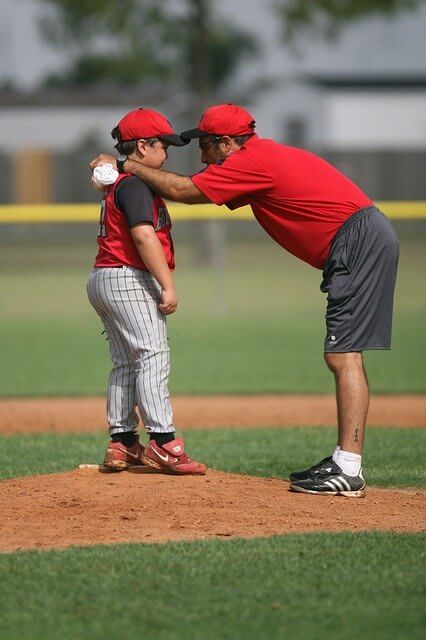
Hello everyone. My name is Jason Butler, and I live in California, America. I was a professional AAA Minor League Baseball player. I lost my chance of playing MLB for injury issues, but I did not lose my love for baseball. I attended the coaching training program and am now working as a coach in a small school in San Diego.
I always love to share my experience and knowledge if that can help you. Play baseball, and stay fit.
The forums are where you can discuss a range of topics related to youth travel baseball. Need a guest player or looking to guest play? Have tryouts coming up? Want to get opinions on equipment or whether to play in a specific tournament? Or just want to discuss some particular issue related to travel baseball? Here’s the spot for you to interact with other parents, coaches, and players who might be interested in your topic.
Home › Forums
- General Discussion

Travel Baseball: A Complete and Updated Guide for 2023
March 11, 2023
James Arnold
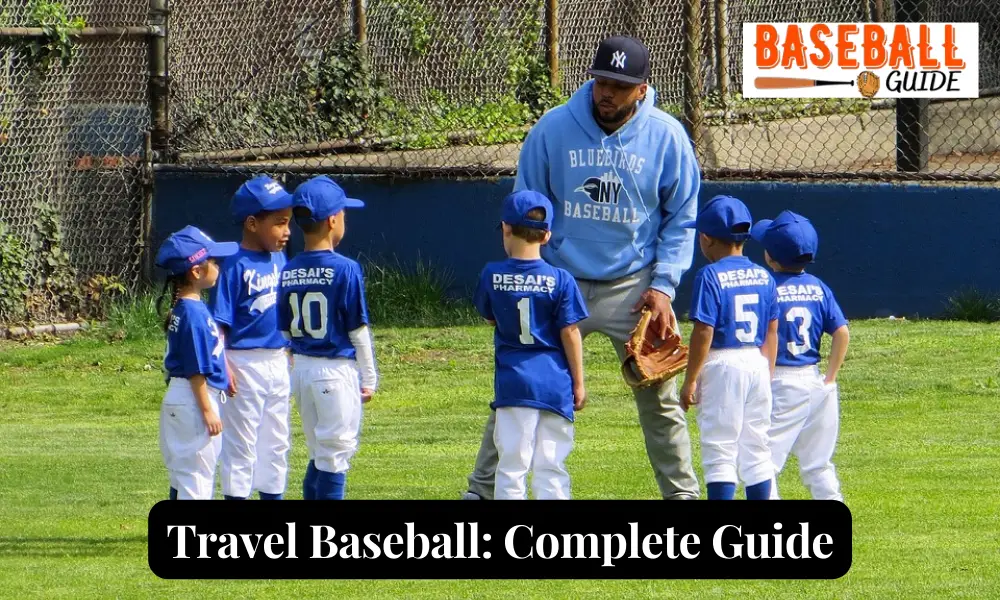
Do you want your child to be a great baseball player?
Are you a youngster who has finally realized that you want to take your baseball skills to the next level?
Or possibly both the parent and the kid are reading together, eager to learn more about improving their baseball skills and turning it into a more serious activity.
If you feel it to be a convenient strategy, participating in travel baseball may provide answers to all of your questions and allow you to accomplish all of your ambitions.
In this article, you will learn all you need to know about travel balls, from the fundamentals to the more advanced aspects.
What Is Travel Baseball?
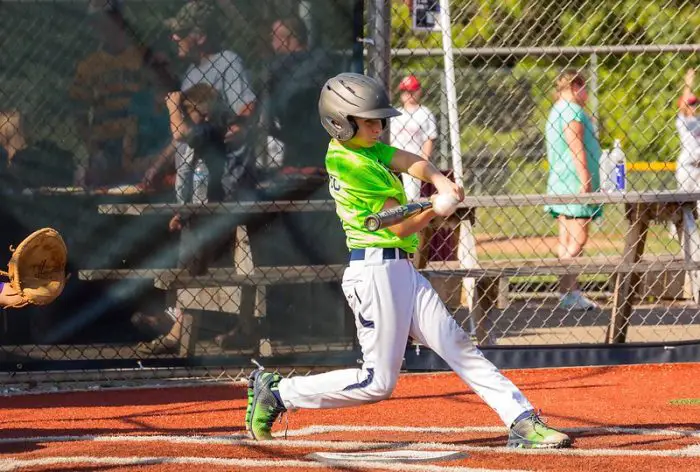
First and foremost, we must familiarize ourselves with the concept of “travel baseball.”
Typically, when people talk about travel baseball, they’re referring to a squad of elite players who participate in tournaments and train at their own facilities.
You may think of it as a sort of youth baseball in which games are played away from home.
Teams known as ‘ travel ball teams or travel teams ‘ in this form of baseball may travel to another state or city to compete in baseball travel tournaments.
Structure Of Competition
A tournament system is used for almost all travel baseball games, played on weekends.
Tournaments may potentially take place anywhere, although they are most often conducted in multi-field sites near major transportation hubs.
You can anticipate traveling more if you reside far away from such transit centers.
The final teams for the event are decided after each travel ball team has played several matches.
Depending on how well a team does, they may play somewhere between three to eight games throughout the course of a two-day or three-day tournament.
The number of tournaments a team may enter isn’t set; although two per month is considered normal, higher-level teams may play more regularly.
Level-Play In Travel Baseball
There are generally three categories of competition in a travel baseball tournament, ranging from the least developed to the most developed level of youth baseball.
This classification is according to Baseball Youth’s DivLevel classification system, which is a travel baseball’s national team division classification system.
1. Division 1 Or D1
Within Baseball Youth’s DivLevel categorization system, Division 1 or D1 is the top level of play.
D1 is better suited for teams considered Major/All-Levels of AAA, Gold, or Elite/Advanced in their respective leagues.
Teams in the D1 division should play the bulk of their games against regionally competitive opponents and/or nationally rated.
2. Division 2 Or D2
Within Baseball Youth’s DivLevel categorization system, Division 2 or D2 is the intermediate level of play.
Teams graded as Medium AA/High AA, Silver, or High-Level Intermediate are best suited to compete at the D1 level.
Teams in the D2 division should play the bulk of their games against other mid-level regional and local opponents in the same division.
3. Division 3 Or D3
Within Baseball Youth’s DivLevel categorization system, Division 3 or D3 is the weakest level of play.
Low AA/All-Levels of A, Bronze, or Low-Level Intermediate/Beginner teams are the greatest fit for the D1 level.
Teams in the D3 division should play the majority of their games against other domestic and regionally-based opponents in the same division.
Travel Baseball Against Little League
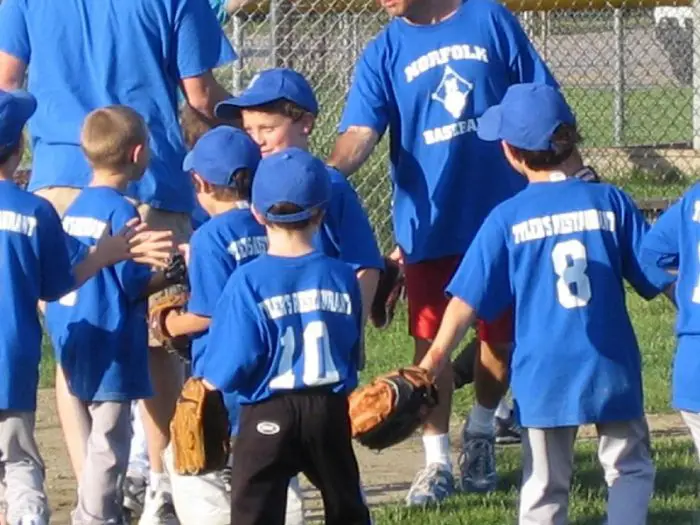
There are several significant parallels and distinctions between travel baseball and little league baseball .
Both aid in developing important life qualities such as a positive work ethic, sportsmanship, cooperation, and the ability to learn from mistakes.
They are, however, significantly different in terms of time investment and competition.
One is recognized for being competitive and raising your skill level, while the other is known for being recreational and a means for youth to learn the rules.
Travel baseball offers a higher competition level than what traditional little leagues provide.
In a single season, roughly 14-20 games are played in both.
There isn’t much difference between these two, other than the amount of seriousness and the fact that you’ll have to travel for a travel ball .
How To Get On A Travel Baseball Team?
As a player, being a member of a travel baseball team is a thrilling experience.
Following are a few pointers that can help you relax and perform at your best, making joining a baseball team much simpler.
1. Be On Time (Or Before Time)

First of all, plan to arrive a few minutes early. If you arrive late, you’ll have to hustle to keep up with everyone.
Arrive early enough to check in, go for a quick jog, play a game of light catch with a buddy, and ease up on your own.
2. If You Are A Baseball Player, Look Like One
Dress appropriately for tryouts; do not show up in jeans or oversized basketball shorts.
The ideal outfit consists of a clean pair of baseball trousers , a decent light sports shirt, and a nice hat worn with the bill facing front.
If you don’t have baseball pants available, a nice pair of sweatpants will do.
3. Practice Makes Perfect
You should play catch even if you only have time to do so twice or three times before the tryout.
If you’ve been to the tryouts previously and are familiar with a few of the activities they’ll be doing; it’s a good idea to put those skills into practice as much as possible.
Practice gaining leads , doing excellent leaps, and anything else you believe you’ll see during the tryout.
4. Play Your Usual
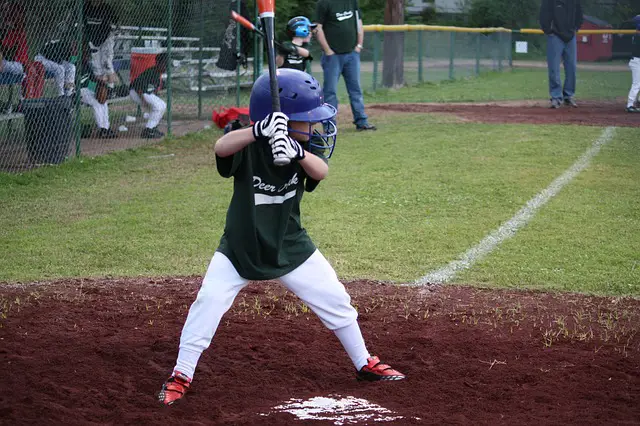
You should just play your game and allow the game to come to you; don’t try to force it.
Simply wait for the right chance to present yourself, and then boldly do your task to the best of your ability.
If you push too hard, you will almost certainly make more errors than you would otherwise.
5. Good Behavior
You’ll be a suitable candidate if you’re willing to work hard and take constructive feedback.
Have a sportsman’s attitude ; if you don’t catch the ball, ask the coach to throw it again instead of pouting.
Don’t be hesitant and hide in places, missing out on the chance to learn what you need to know in travel teams.
Also, remember to be kind to your teammates , motivating them when they make errors and communicating with them regularly while conducting the exercises.
Advantages And Disadvantages Of Travel Baseball
There are upsides and downsides to consider when it comes to travel baseball.
- Strong Competition: Travel baseball lets kids play with and against some of the finest players in their region and even beyond.
The players are more committed to the game and motivated to progress. Your child’s performance will be pushed to the limit by the increased level of competition.
- Improved Coaching: Coaches are frequently ex-players who have gone on to coaching careers in the sport.
There is a higher likelihood that a travel baseball coach will be better educated, more experienced, and more tied to the game.
- Fun Experience: Many weekends will be spent in hotels together, learning about new places and bonding as a group in a travel baseball team.
It’s one of the best ways for young people to go to new places around their region and the country, and they can do it while having an amazing time with their teammates.
- Easy Exposure: You can get a lot of attention from college and professional scouts by playing travel baseball.
One of the best things about being on a high-level travel baseball team is meeting other high-level coaches.
- Character Growth: The significance of travel teams about being on time, behaving well, and putting in the most effort makes a child more disciplined.
As young people move from Minor League Baseball (MiLB) to Major League Baseball ( MLB ), they already have the sense of urgency that they need.
Disadvantages
- Very Competitive: Travel teams take their games seriously and strive to win games.
A travel team must balance the development of its players while still attempting to win matches. This often results in players who aren’t the greatest not having a chance to play.
- Costly: Travel baseball is costly and sometimes extremely costly, which might be a reason for most kids to drop its idea.
- Prioritized Task: Even a reasonably competitive travel squad may consume a summer’s worth of weekends.
As a result, it is a time-consuming task that you must be able to prioritize.
Frequently Asked Questions About Travel Baseball
Some common questions about travel baseball are:

1. How Do Baseball Players Travel?
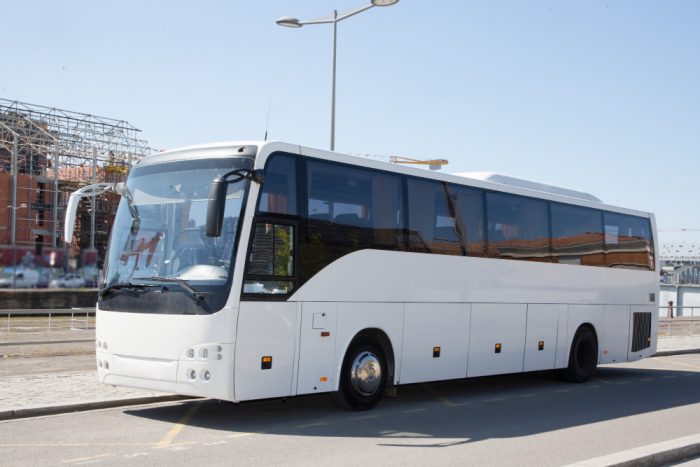
Teams may travel by bus if the shortest path between the two cities is less than 200 miles.
Anything longer than that necessitates plane travel , with all flights being nonstop.
Major airlines, which are generally among the team’s sponsors, charter flights for most MLB clubs.
2. When Does Travel Baseball Season Start?

The travel season is divided into two seasons: Yearly Season (Main) and Fall Season (Optional)
The yearly season starts from around April 1, ends in August , and is compulsory.
While the fall season spans from around September to the late part of October, which is optional.
3. Who Can Play Travel Baseball?
The 8-year-old squad, mostly composed of 2nd and 3rd students, is the first to go.
4. What Age Is Best For Transitioning To Travel Baseball?
Travel baseball would be a logical next step for children aged 11 to 12 (but not younger than that) who want to enhance their talents to the level of a professional player.
5. Is Travel Baseball Worth The Money

Whether Travel Baseball is worth the money or not depends on how serious you are about getting your skills to higher levels.
It gives extra opportunities for committed baseball players who want to get the most out of each year
6. How Much Does Travel Baseball Cost?
The exact cost of participating in travel baseball differs, but it typically costs somewhere around $500 and $2,500 per year.
Travel baseball is an effective way to enhance your skills and increase your chances of playing in college or as a professional.
But, do not overlook the expense and investment of time that comes along with the benefits travel ball gives.
Only the most costly team doesn’t need to make your kid adequately talented to join a team in college or select baseball as a profession, a fairly priced team may be similarly trained and qualified, so you need to get into a team thoughtfully.
After reading this article, I hope that you have a firm grasp of all of the technicalities surrounding travel baseball .
About The Baseball Guide
Follow Us on Social Media
Thebaseballguide.com is a participant in the Amazon Services LLC Associates Program, an affiliate advertising program designed to provide a means for sites to earn advertising fees by advertising and linking to Amazon.com. As an Amazon Associate, I earn from qualifying purchases.
Copyright © 2017 - 2023 Thebaseballguide.com - All Rights Reserved.

Featured Events

Join our Facebook community!
Post your travel baseball tournament, event, tryout, etc. for free. View and get info on upcoming travel baseball tournaments in Kentucky, Bowling Green, Louisville, Lexington, Northern Kentucky, South Central Kentucky, Eastern Kentucky, Western Kentucky. KYTravelBall.com is your source for all the latest information on travel ball happenings.
Jetpack has locked your site's login page.
Your IP address 5.188.62.26 has been flagged for potential security violations. You can unlock your login by sending yourself a special link via email. Learn More
We've detected unusual activity from your computer network
To continue, please click the box below to let us know you're not a robot.
Why did this happen?
Please make sure your browser supports JavaScript and cookies and that you are not blocking them from loading. For more information you can review our Terms of Service and Cookie Policy .
For inquiries related to this message please contact our support team and provide the reference ID below.
High school baseball team’s season suspended after killing chicken on field, officials say
VALLEY CENTER, Kan. ( KWCH /Gray News) – A high school baseball team in Kansas is under criminal investigation after police said they killed a chicken on their baseball field.
The Valley Center Department of Public Safety confirmed that a chicken was killed on the baseball diamond at Valley Center High School.
Police said a Valley Center High School employee contacted a school resource officer on Monday about allegations that the baseball team had killed a chicken on the field before traveling to an away game on Saturday.
On Monday afternoon, the district sent a letter to parents alerting them that the varsity baseball team’s season has been suspended because of an animal cruelty investigation.
Police are investigating the alleged crime as animal cruelty with malicious torture or killing, which is a felony in Kansas.
Investigators are working to determine exactly who was on the field when the chicken was killed and whether coaches or other adults were involved.
Once the police investigation is complete, the case will be presented to the Sedgwick County District Attorney’s Office. The office will decide if any charges will be filed.
In the meantime, the baseball team’s season remains suspended.
Copyright 2024 KWCH via Gray Media Group, Inc. All rights reserved.

Siblings, ages 4 and 8, killed after car crashes into child’s birthday party in Monroe Co.

Woman charged with murder in fatal birthday party crash that killed 2 kids, injured 15 people

Woman charged in deadly birthday party crash released on bond

Missing mother of 10 found dead in car trunk, police say

Dog known to be aggressive attacks 11-month-old in Toledo
Latest news.

4/27: Erin's Saturday 11pm Forecast

Amber Alert issued for 2-year-old abducted from Texas park, police say

Two people killed, one critically injured after 350,000-pound load detaches from 18-wheeler, officials say

Man mauled to death by his pit bull, police fatally shoot dog inside apartment

4/27: Erin's Saturday Evening Forecast
Blue Jays, facing Royals, seek fifth straight series win
- Medium Text
Our Standards: The Thomson Reuters Trust Principles. New Tab , opens new tab

Sports Chevron

Brad Marchand's record goal helps Bruins beat Maple Leafs
Jeremy Swayman started back-to-back games for the first time in more than two months and made 25 saves to help the visiting Boston Bruins take command of the Eastern Conference first-round series against the Toronto Maple Leafs with a 3-1 win in Game 4 on Saturday night.


IMAGES
COMMENTS
This group is designed for coaches and players to be able to connect. Coaches can post try-out and team information. Players and parents can search for teams. This is a public group for the...
Here on travel ball we accept all sports. Great place to connect Players with teams, and get training tips and access to training camps. Please feel free to post your team and where you are located at.
The specific answer varies, but the typical range of cost for participating in travel baseball is between $500 and $2,500 per year. That said, you can end up spending a lot more than that. Back in 2011, CBS News reported that one Georgia family paid $4,000 per year for their 9-year-old son's travel team.
Seek out travel baseball message boards and Facebook groups, and post all the details of your tryouts - making sure to include a link to your shiny new website or social media profiles. There are even Instagram profiles dedicated exclusively to posting the details of travel ball tryouts, so take advantage of these as well.
Youth travel teams and tournaments for baseball, basketball, football, soccer, softball, and volleyball. Get active. ... Up until this point, travel sports has been segmented and difficult to navigate. We are the central location for all things travel ball. Teams Upcoming tryouts, guest players, and scrimmages all in one place. ...
Open forum for parents to discuss travel ball teams, players to find travel ball teams, teams to promote their team & advertise tryouts, and to provide information regarding tournaments in San Diego...
Local Travel Teams: For beginners starting their journey through travel baseball. The games they play are mostly local or within a close driving distance. Practices only happen a few times a week, and games during the weekend. 2. Regional Travel Teams: For players with more experience and higher skill levels.
Forums. The forums are where you can discuss a range of topics related to youth travel baseball. Need a guest player or looking to guest play? Have tryouts coming up? Want to get opinions on equipment or whether to play in a specific tournament?
1. Be On Time (Or Before Time) First of all, plan to arrive a few minutes early. If you arrive late, you'll have to hustle to keep up with everyone. Arrive early enough to check in, go for a quick jog, play a game of light catch with a buddy, and ease up on your own. 2. If You Are A Baseball Player, Look Like One.
Cons. Cost - The price of playing travel can be high, sometimes up to $5k per year. Time - Playing travel ball takes up a lot of time, so hopefully, you don't like your weekends free in the summer. Competitive - Travel ball can also be a lot of fun, but it's way more competitive.
Join our Facebook community! Post your travel baseball tournament, event, tryout, etc. for free. View and get info on upcoming travel baseball tournaments in Kentucky, Bowling Green, Louisville, Lexington, Northern Kentucky, South Central Kentucky, Eastern Kentucky, Western Kentucky. KYTravelBall.com is your source for all the latest ...
In conclusion, the State of Travel Ball survey conducted in June 2023 provides a comprehensive view of the experiences of approximately 700 parents of baseball players involved in travel teams. The survey reveals that despite the significant financial commitments, with an average annual cost of $2,178, and the time and travel demands, most ...
This three-night package includes your choice of luxury accommodations, breakfast each morning of your stay, premium tickets to two games located in sections above the dugouts, round trip transportation to and from the games, a premium Mexico City Series travel bag, and more. Make your plans today!
This month, 21 current and former Major League Baseball players invested their own money in youth baseball. If that sounds like a feel-good story in which baseball's past paves the way for ...
VALLEY CENTER, Kan. (KWCH/Gray News) - A high school baseball team in Kansas is under criminal investigation after police said they killed a chicken on their baseball field.The Valley Center ...
April 22 - The Toronto Blue Jays have won four straight series as they travel to Kansas City to open a four-game set with the Royals starting Monday evening. The Blue Jays have ridden Daulton ...